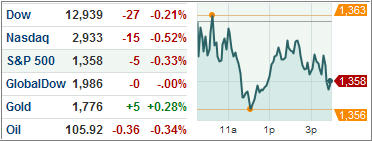US equity indexes ended the day lower as markets took a break on Wednesday after rallying for three sessions amid fears about global recovery and the sustainability of Greek measures in the mid-term.
There has been much chatter about a possible contagion in the short-term when the Greek crisis had broken out. This hypothesis has become irrelevant now since private-sector lenders have been forced to take a 70 percent haircut anyway and the distinction between a default and bailout is merely a technical detail now.
As far as Greece is concerned, a feasible (and possible) solution could be the so-called ‘internal devaluation’ of the euro to make the country more competitive. This will involve mainly wage reduction inside the country, forcing workers to live on fewer Euros than they have been used to.
The danger for Germany, and for that matter the rest of Europe, is the possible collapse of the single market, the biggest single economic zone in the world. Populist politics may take over Europe triggering protectionism, thus damaging Berlin’s potential growth prospects since it’s heavily reliant on external trade. Nonetheless German carmakers have already beat the odds in a slowing Europe by boosting sales in the emerging and Latin American markets and the capital goods sector may prove just as adaptable.
The protracted negotiations that resulted in the latest bailout for Athens has exposed the policymakers’ serious limitations in fighting a crisis, argue analysts. Many doubt if Brussels have the policy tools to respond to other bigger economies including Spain, Italy, Portugal and Ireland.
The approach of cutting budget deficits taken by the European leaders in the case of Greece may not be replicated for other troubled economies, lest private investors stop buying sovereign securities, thus driving yields through the roof. Also lack of measures in the latest deal to stimulate economic activities has the markets worried globally. Greece is expected to contract by 4 percent this fiscal, the fifth year in a row with the recession deepening.
These doubts possibly played on the markets on Wednesday as did the decision by ratings agency Fitch to downgrade the country further in junk status, from ‘CCC’ to ‘C’, just one notch higher than the lowest at ‘D’. A draft new law aimed at implementing the new rescue package showed public deficit will be at 6.7 percent of GDP, missing the previous estimate of 5.4 percent by a wide margin.
Add to this the growing discontent among the working class and the looming April elections, considered a major flashpoint by observers, and skepticism about the bailout plan succeeding is high among the investors.
The DJIA shed 0.2 percent, after a four session winning-run. It’s still up about six percent YTD. 20 Dow components out of 30 closed lower today, led by discount retailer Wal-Mart Inc. The S&P dropped 0.3 percent, with financials faring the worst and energy glowing the brightest. The NASDAQ fell 0.5 percent; its third straight loss.
Unexpected rally of the yellow metal pushed the Van Eck Market Vectors Gold Miners ETF (GDX) higher as it remained the day’s best performer, gaining 1.81 percent on the day.
One of the weakest performers was State Street SPDR Homebuilders ETF (XHB), shedding 1.46 percent as existing home sales came lower than expected in January.
Elsewhere, Chinese manufacturing grew slower in February as indicated by the HSBC China manufacturing index. Also private sector activity contracted in Europe in February as the lower than expected PMI data fell back into contraction territory.
Oil slipped 27 cents to $105.98 for April Delivery, while gold futures for April delivery were up $12.80 an ounce. Our Trend Tracking Indexes (TTIs) retreated with the major indexes but remain solidly entrenched in bull market territory.
Disclosure: Holdings in GLD
Contact Ulli
